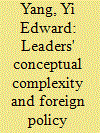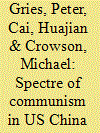| Srl | Item |
| 1 |
ID:
101611


|
|
|
|
|
| Publication |
2010.
|
| Summary/Abstract |
Present research on foreign policy change (FPC) focuses on systemic-structural variables and domestic politics as key causal factors motivating states to change their foreign policy behaviour. Recent works also look towards decision context and bureaucratic politics to explain FPC. 1 In this article, I concur with Walter Carlsnaes 2 in arguing that attention should focus more on exploring the role of human agents, i.e. leaders that make actual foreign policy decisions, when explaining and predicting FPC. Specifically, I use the leadership traits analysis (LTA) framework to argue that a leader's level of conceptual complexity interacts with external stimuli (system- and/or domestic-level factors) to affect: (i) the leader's willingness to change course in response to policy failure and (ii) the type of changes that the leader is likely to carry out.
|
|
|
|
|
|
|
|
|
|
|
|
|
|
|
|
| 2 |
ID:
101610


|
|
|
|
|
| Publication |
2010.
|
| Summary/Abstract |
Recent survey research suggests that, on average, Americans of all political stripes hold more positive attitudes towards the Chinese people than they do towards the Chinese government. This tendency appears more pronounced, however, among Republicans and conservatives, who are significantly more negative about the Chinese government than Democrats and liberals. 1
What best explains these two findings? In the wake of the January 2010 'Google Incident' and the Obama administration's announcement of continued arms sales to Taiwan, a February 1st People's Daily Online editorial declared that 'Cold War thinking' continues to bias Americans against China. American ideology, it argued, is imbued with a 'deeply-rooted hostility against and fear of … communism'. 2
|
|
|
|
|
|
|
|
|
|
|
|
|
|
|
|